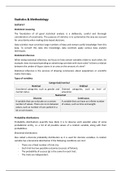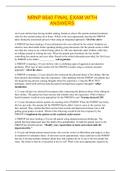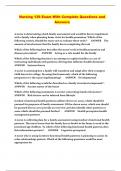Maisie Smith
UNIT 8 PROMOTING
PUBLIC HEALTH
OUR HEALTHY NATION?
MAISIE SMITH
,P1 – explain the strategies used to develop public health policy in order for it to meet its
aims
Policies of public health were being implemented all the way back to the 1940s continuing
to the current year. The most influential reports were as followed. Public health policies are
developed in order to protect people’s health and wellbeing and to ensure that they have
the safest and best quality of life possible. The department of health is responsible for
identifying the nation’s health needs in the UK, and for developing programmes to reduce
risks and to screen for early signs of diseases.
Public health policies aim to educate the public on the importance of healthy behaviours
and lifestyles, this is essential in motivating people to take an active role in promoting their
own health. Through different outreach and awareness programmes health care
professionals and policy makers are able to inform the public of the various ways in which
they can maintain a healthy lifestyle and how they can make appropriate changes to their
daily habits. In England the department of health is responsible for identifying the public’s
health needs, and for developing programmes to reduce the risks and to screen for early
signs of diseases. They work with other agencies so that they can have the fullest
understanding of the issues surrounding the nation’s health so that they can create policies
and legislation nationwide. Each policy issue is broken down into further areas of concern so
that it can be dealt with accordingly. For example, school food looks at caterers introducing
healthier foods into school menus, and it includes research that is undertaken by public
health England and the government buying standards.
Public health researchers within the department of health will use data to study a
populations health and to identify specific areas of problems in health. They will use a rage
of different agencies throughout the UK, they will obtain the correct information for what to
plan and to put into place to help and support people with their health. This data will also
be used to identify gaps in public health services so that the policy makers can set
measurable goals and objectives and so that they can track the impact of their policies more
closely.
Policy makers will often work with different stakeholders for the effectiveness of their
policies so that they can gain a better understanding of the needs of the greater population
and so that they can tailor their policies and programmes in a way that will best suit those
specific needs. Policies will be evaluated frequently to ensure that they are effective,
through doing this the policy makers can also monitor the success of their initiatives and
they are able to make any necessary changes that may be needed to better the success of
the policies.
The department for environment, food, and rural affairs (Defra) has the responsibility for
minimising harm from environmental conditions that could cause diseases. Defra works
with environmental protection UK to have the ability to implement the air quality strategy
for England, Scotland and Wales and norther Ireland. The strategy aims to minimise levels of
harmful industrial pollutants in the air such as lead, sulphur dioxide and nitrogen oxide. The
1|Page
, levels for their output are set and checked nationally including emissions from industry and
sea pollution.
For issues including recycling and waste management, the government works closely with
the environment agency, they work with local agencies concerned with waste and recycling.
This ensures that waste management companies are regulated and monitored by the local
authority and permits are issued to companies that apply to recycle or dispose of waste.
Each category of waste has its own regulations, Waste Electrical and Electronic Equipment
(WEEE) Guidance sets targets for the recycling of objects such as small and large household
appliances.
The food standards agency is a government department responsible for food safety and
hygiene throughout the UK. They work with seven other agencies and local authorities to
enforce food safety regulations. The advisory committee on novel foods and processes
advises the food standards agency about genetically modified foods and irradiation of foods,
genetically modified foods and irradiation of foods are not necessarily considers to be any
more of a risk to human foods than conventional foods, but the general public has
frequently expressed their concerns surrounding the safety and regulations of these foods
including labelling and the environmental impacts.
The Beveridge report 1942
In 1942 the government commissioned Sir William Beveridge to investigate ways that the
country could recover from the second world war, he had a lot of experience in politics, and
he was an expert on the problem of unemployment. The report stated that the post war
period was a time for radical change, one recommendation was that the government should
find ways to fight disease.
The Beveridge report aimed to create a comprehensive system of social insurance, it
proposed that all working people would pay a weekly contribution to the state and in return
the benefits would be paid to the unemployed, the sick, the retired and the widowed.
The National health service act 1946
In 1945 the new labour government took on the recommendations of the Beveridge report
and the national service act was passed in 1946 and it came into force in 1948, the NHS
would be financed by tax that would benefit every person and it would be available from
‘cradle to grave’. For the first time people were able to receive a diagnosis and treatment of
any illness from home or at a hospital, this also included dental and ophthalmic treatment
and it was regardless of people’s abilities to pay. This was put into place so that the people
who needed things like free health care the most would receive this for free of charge and it
was intended to better generations to come.
Declaration of Alma Ata 1978
The declaration of Alma Ata identified primary health care as the key to the reaching of the
goal of health for all and it acknowledged their concerns for gross inequalities in the health
status of people, particularly between developed and developing countries. They identified
2|Page
UNIT 8 PROMOTING
PUBLIC HEALTH
OUR HEALTHY NATION?
MAISIE SMITH
,P1 – explain the strategies used to develop public health policy in order for it to meet its
aims
Policies of public health were being implemented all the way back to the 1940s continuing
to the current year. The most influential reports were as followed. Public health policies are
developed in order to protect people’s health and wellbeing and to ensure that they have
the safest and best quality of life possible. The department of health is responsible for
identifying the nation’s health needs in the UK, and for developing programmes to reduce
risks and to screen for early signs of diseases.
Public health policies aim to educate the public on the importance of healthy behaviours
and lifestyles, this is essential in motivating people to take an active role in promoting their
own health. Through different outreach and awareness programmes health care
professionals and policy makers are able to inform the public of the various ways in which
they can maintain a healthy lifestyle and how they can make appropriate changes to their
daily habits. In England the department of health is responsible for identifying the public’s
health needs, and for developing programmes to reduce the risks and to screen for early
signs of diseases. They work with other agencies so that they can have the fullest
understanding of the issues surrounding the nation’s health so that they can create policies
and legislation nationwide. Each policy issue is broken down into further areas of concern so
that it can be dealt with accordingly. For example, school food looks at caterers introducing
healthier foods into school menus, and it includes research that is undertaken by public
health England and the government buying standards.
Public health researchers within the department of health will use data to study a
populations health and to identify specific areas of problems in health. They will use a rage
of different agencies throughout the UK, they will obtain the correct information for what to
plan and to put into place to help and support people with their health. This data will also
be used to identify gaps in public health services so that the policy makers can set
measurable goals and objectives and so that they can track the impact of their policies more
closely.
Policy makers will often work with different stakeholders for the effectiveness of their
policies so that they can gain a better understanding of the needs of the greater population
and so that they can tailor their policies and programmes in a way that will best suit those
specific needs. Policies will be evaluated frequently to ensure that they are effective,
through doing this the policy makers can also monitor the success of their initiatives and
they are able to make any necessary changes that may be needed to better the success of
the policies.
The department for environment, food, and rural affairs (Defra) has the responsibility for
minimising harm from environmental conditions that could cause diseases. Defra works
with environmental protection UK to have the ability to implement the air quality strategy
for England, Scotland and Wales and norther Ireland. The strategy aims to minimise levels of
harmful industrial pollutants in the air such as lead, sulphur dioxide and nitrogen oxide. The
1|Page
, levels for their output are set and checked nationally including emissions from industry and
sea pollution.
For issues including recycling and waste management, the government works closely with
the environment agency, they work with local agencies concerned with waste and recycling.
This ensures that waste management companies are regulated and monitored by the local
authority and permits are issued to companies that apply to recycle or dispose of waste.
Each category of waste has its own regulations, Waste Electrical and Electronic Equipment
(WEEE) Guidance sets targets for the recycling of objects such as small and large household
appliances.
The food standards agency is a government department responsible for food safety and
hygiene throughout the UK. They work with seven other agencies and local authorities to
enforce food safety regulations. The advisory committee on novel foods and processes
advises the food standards agency about genetically modified foods and irradiation of foods,
genetically modified foods and irradiation of foods are not necessarily considers to be any
more of a risk to human foods than conventional foods, but the general public has
frequently expressed their concerns surrounding the safety and regulations of these foods
including labelling and the environmental impacts.
The Beveridge report 1942
In 1942 the government commissioned Sir William Beveridge to investigate ways that the
country could recover from the second world war, he had a lot of experience in politics, and
he was an expert on the problem of unemployment. The report stated that the post war
period was a time for radical change, one recommendation was that the government should
find ways to fight disease.
The Beveridge report aimed to create a comprehensive system of social insurance, it
proposed that all working people would pay a weekly contribution to the state and in return
the benefits would be paid to the unemployed, the sick, the retired and the widowed.
The National health service act 1946
In 1945 the new labour government took on the recommendations of the Beveridge report
and the national service act was passed in 1946 and it came into force in 1948, the NHS
would be financed by tax that would benefit every person and it would be available from
‘cradle to grave’. For the first time people were able to receive a diagnosis and treatment of
any illness from home or at a hospital, this also included dental and ophthalmic treatment
and it was regardless of people’s abilities to pay. This was put into place so that the people
who needed things like free health care the most would receive this for free of charge and it
was intended to better generations to come.
Declaration of Alma Ata 1978
The declaration of Alma Ata identified primary health care as the key to the reaching of the
goal of health for all and it acknowledged their concerns for gross inequalities in the health
status of people, particularly between developed and developing countries. They identified
2|Page










